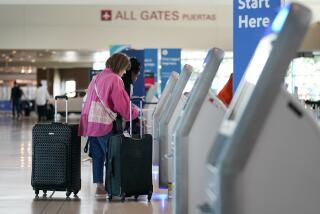High Fees ‘Good Way’ to Ease Airport Delays, Mineta Says
- Share via
WASHINGTON — Transportation Secretary Norman Y. Mineta said Tuesday that he supports charging airlines steep congestion fees for landing at busy airports during peak travel hours to ease delays.
The controversial proposal--backed by some airport managers and economists and opposed by airlines--would force the carriers to spread out their schedules. However, critics warn that it could reduce service to smaller communities and raise prices for business travelers who prefer to fly at the beginning and end of the day.
“My personal feeling is that I think it is a legitimate and good way to go about this,” Mineta said in his first round of in-depth interviews since he was confirmed by the Senate in late January.
Mineta said that, ideally, he would prefer to increase the system’s capacity by building more runways and airports. But given that such projects can take decades, “this is one area where we may have to do something on the demand side.” Mineta has previously called for speeding the construction of new runways by streamlining the process of environmental reviews.
Mineta, 59, the only Democrat in President Bush’s Cabinet, projects a sense of confidence. He built his expertise on often-complex transportation issues during nearly 21 years in Congress, where he represented Silicon Valley. Major industry, labor and consumer interest groups welcomed his appointment. As secretary, he faces a difficult challenge in trying to improve the Federal Aviation Administration’s record on air travel delays.
Nonetheless, Mineta said he opposes the most ambitious aviation reform currently being debated: converting the air traffic control system into a private, not-for-profit corporation.
While Bush’s budget called for a study of that idea, Mineta said, “To me, safety is a government responsibility, and to that extent, I think [air traffic control] should remain a government function.”
He downplayed any difference between his position and the White House stance, saying the brief reference in the budget to a private system was not meant to be taken as an endorsement.
“Knowing the organization that we have, I want to put my time and effort into making it work,” Mineta said. “I don’t want to spend time--or political bullets--trying to convince people to try something different.” A privatization scheme, he added, would be politically dead on arrival on Capitol Hill.
Asked to predict what this summer may bring in terms of air traffic delays, the secretary made a face and joked: “You want to see a grown man cry?”
The combination of thunderstorms and increased tourist travel has made for two straight summers of misery at major airports around the country--and the number of passengers is projected to keep increasing.
But Mineta said he is cautiously optimistic that lessons learned by the FAA and the airlines will help ease delays somewhat this ummer. “It won’t be hunky-dory, but I think we will be in better shape this summer, even with increases in traffic.”
He said more sophisticated weather forecasting and improved coordination between the airlines and the FAA should make things run more smoothly. However, he acknowledged that his rosy scenario can evaporate if there is a round of airline strikes.
Most industry and government experts say it will take a major effort over a decade or more to upgrade the U.S. air travel system. In addition to new runways and airports, the FAA will have to replace cumbersome technology that relies on ground-based radar with more flexible satellite-based systems.
The idea of congestion fees for landing at peak times is getting attention as a stopgap measure that might ease gridlock at the busiest airports. That, in turn, would help the rest of the country, since backups at major airports have a wide ripple effect.
Currently, airports set landing fees for aircraft and keep them low. At the 10 most congested airports, they average about $2.75 per occupied seat on a Boeing 737 airliner. Economists say the fees would be hiked by as much as 10 times to affect airline scheduling.
Airport managers are looking for a policy statement from Washington that would open the way for them to impose higher fees. The first airport expected to experiment with the idea is New York’s La Guardia. Los Angeles International has no plans to charge higher fees.
More to Read
Inside the business of entertainment
The Wide Shot brings you news, analysis and insights on everything from streaming wars to production — and what it all means for the future.
You may occasionally receive promotional content from the Los Angeles Times.










